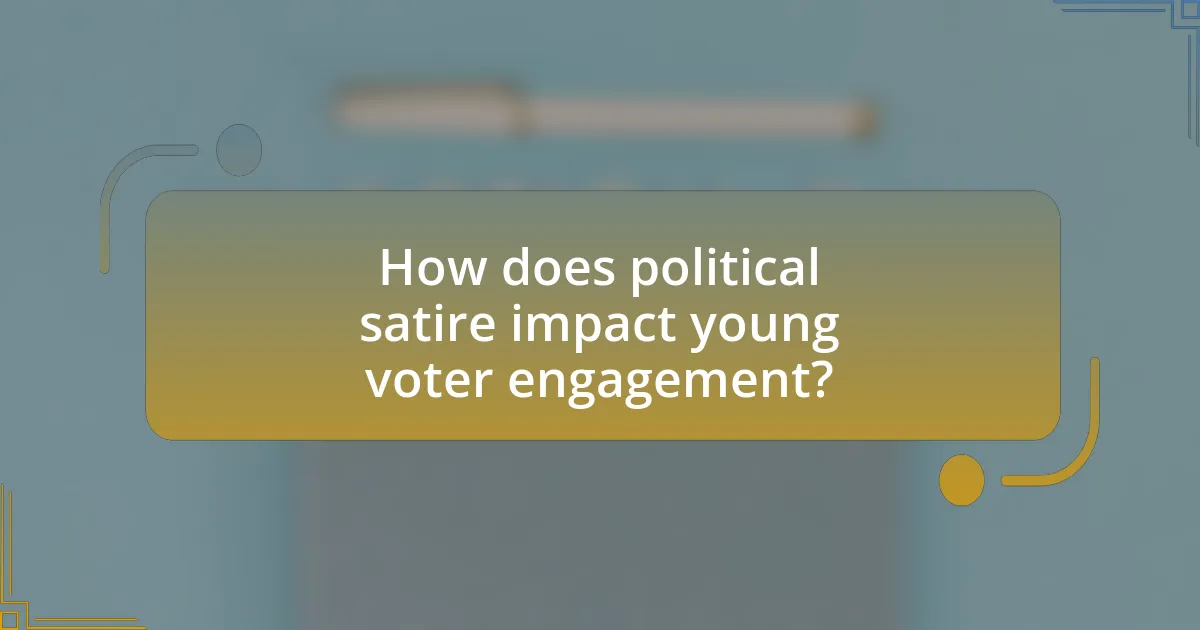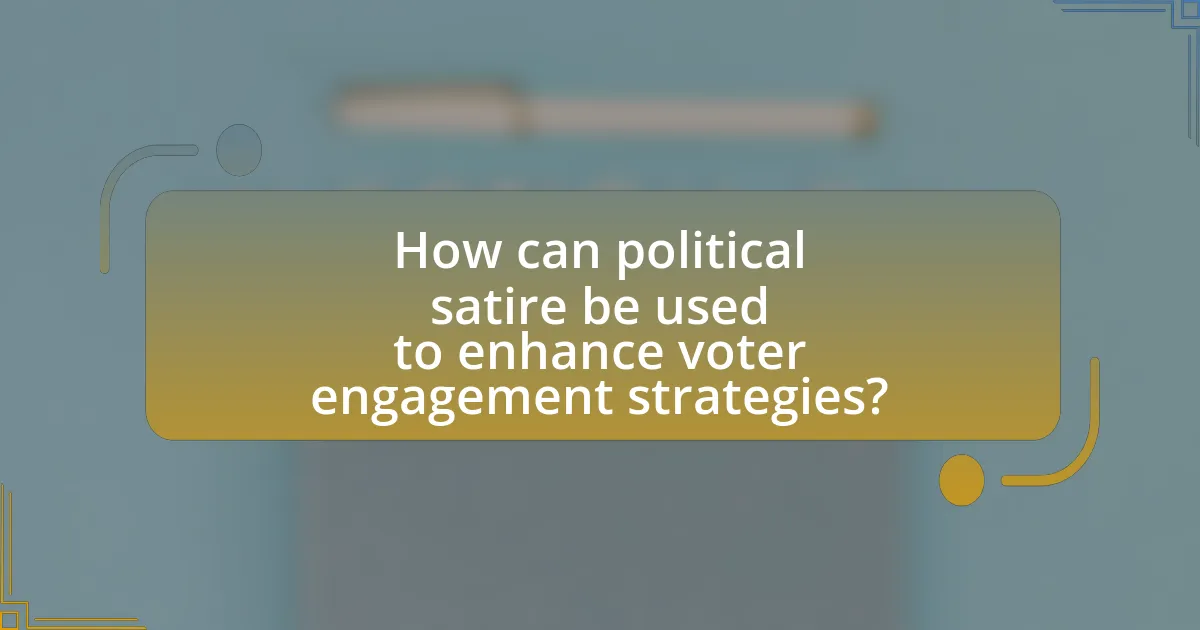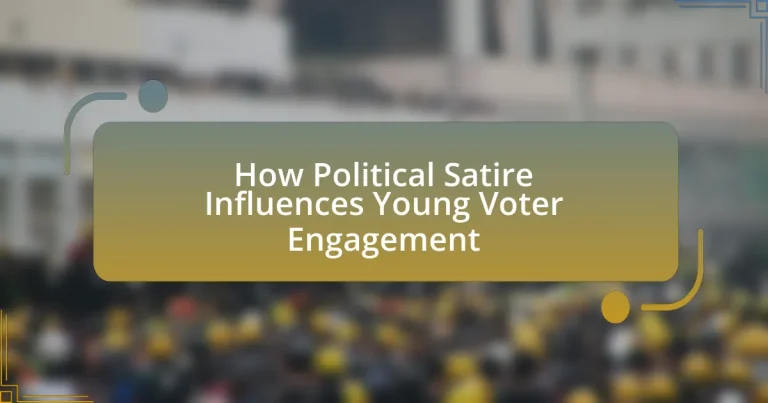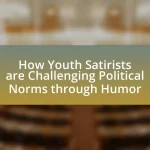Political satire plays a significant role in enhancing young voter engagement by making political discourse more relatable and accessible. Research shows that humor in political satire simplifies complex issues, encourages critical thinking, and fosters discussions among younger audiences, ultimately motivating them to participate in elections. The article explores how humor influences perceptions of political candidates, the effectiveness of satire compared to traditional news, and the cultural factors that contribute to its popularity among youth. Additionally, it discusses the responsibilities of satirists in presenting accurate information and offers strategies for campaigns to leverage satire effectively in their voter engagement efforts.

How does political satire impact young voter engagement?
Political satire significantly enhances young voter engagement by making political discourse more relatable and accessible. Research indicates that young audiences are more likely to engage with political content that is presented humorously, as it lowers barriers to understanding complex political issues. For instance, a study by the Pew Research Center found that 61% of young adults reported that satirical news helped them understand political issues better. This engagement often translates into increased interest in voting, as satire can motivate young voters to participate in elections by highlighting the importance of their voices in a humorous yet impactful manner.
What role does humor play in political satire?
Humor serves as a critical tool in political satire by making complex political issues more accessible and engaging for audiences. It allows satirists to highlight absurdities and contradictions in political behavior, thereby encouraging critical thinking among viewers. For instance, shows like “Saturday Night Live” and “The Daily Show” use humor to dissect political events, making them relatable and prompting discussions among younger audiences. Research indicates that humor in political satire can increase political awareness and motivate young voters to participate in the electoral process, as it often simplifies intricate topics and fosters a sense of community through shared laughter.
How does humor make political issues more relatable to young voters?
Humor makes political issues more relatable to young voters by simplifying complex topics and creating an emotional connection. When political satire is employed, it often highlights absurdities in policies or political behavior, making these issues more digestible and engaging for a younger audience. For instance, studies show that young people are more likely to engage with political content that uses humor, as it lowers their defenses and encourages them to think critically about the issues presented. Research from the Pew Research Center indicates that 61% of young adults find political humor appealing, which suggests that humor effectively captures their attention and fosters discussions around important political matters.
What types of humor are most effective in engaging young audiences?
Political satire, particularly when it employs relatable and absurd humor, is most effective in engaging young audiences. This type of humor resonates with younger demographics because it often reflects their experiences and perspectives, making complex political issues more accessible and entertaining. Research indicates that young people are more likely to engage with political content that uses humor to simplify and critique political narratives, as seen in platforms like “The Daily Show” and “Saturday Night Live.” These shows utilize satire to highlight the absurdities of political situations, which not only entertains but also encourages critical thinking and discussion among young viewers.
Why is political satire particularly appealing to younger demographics?
Political satire is particularly appealing to younger demographics because it combines humor with critical commentary on current events, making complex political issues more accessible and engaging. Younger audiences often seek content that resonates with their values and experiences, and political satire effectively addresses societal concerns, such as inequality and climate change, in a relatable manner. Research indicates that platforms like social media amplify the reach of satirical content, allowing it to spread rapidly among younger viewers, who are more likely to consume news through these channels. For instance, a study by the Pew Research Center found that 61% of young adults aged 18-29 often get their news from social media, where political satire thrives. This blend of entertainment and information not only captures attention but also encourages critical thinking and discussion about political issues, fostering greater engagement in the democratic process.
What cultural factors contribute to the popularity of political satire among youth?
Political satire is popular among youth due to cultural factors such as the rise of digital media, a desire for relatable content, and a growing skepticism towards traditional political institutions. The prevalence of social media platforms allows for quick dissemination and sharing of satirical content, making it easily accessible to younger audiences. Additionally, youth often seek humor and relatability in political discourse, which satire provides by highlighting absurdities in politics. Furthermore, a general distrust in established political systems encourages young people to engage with satire as a form of critique and commentary, reflecting their frustrations and aspirations. This combination of accessibility, relatability, and critical engagement solidifies the appeal of political satire among the youth demographic.
How does social media influence the consumption of political satire by young voters?
Social media significantly influences the consumption of political satire by young voters by providing a platform for immediate access and sharing of satirical content. This accessibility allows young voters to engage with political satire in real-time, often amplifying its reach through shares and likes, which can lead to increased visibility and discussion around political issues. Research indicates that platforms like Twitter and Instagram are particularly effective, as they enable users to interact with satirical content and creators directly, fostering a sense of community and participation in political discourse. For instance, a study by the Pew Research Center found that 55% of young adults aged 18-29 reported encountering political satire on social media, highlighting its role in shaping their political views and engagement.
What are the effects of political satire on young voters’ perceptions?
Political satire significantly shapes young voters’ perceptions by enhancing their political awareness and engagement. Research indicates that exposure to political satire can lead to increased interest in political issues, as it often simplifies complex topics and presents them in an entertaining format. For instance, a study published in the journal “Political Communication” by researchers at the University of Pennsylvania found that young adults who consume political satire are more likely to discuss political topics and participate in civic activities compared to those who do not. This engagement is further supported by the fact that political satire often critiques political figures and policies, prompting young voters to form opinions and take action based on the information presented.
How does political satire shape young voters’ opinions on candidates?
Political satire significantly shapes young voters’ opinions on candidates by providing a critical lens through which they can evaluate political figures and their policies. This form of media often simplifies complex political issues, making them more accessible and engaging for younger audiences. Research indicates that exposure to political satire can enhance political awareness and stimulate discussions among young voters, leading to more informed opinions. For instance, a study published in the journal “Political Communication” found that young adults who consume political satire are more likely to express skepticism towards candidates and their platforms, as satire often highlights inconsistencies and absurdities in political rhetoric. This critical engagement fosters a more discerning electorate, as young voters learn to question the authenticity and motives of candidates.
What specific examples illustrate shifts in opinion due to satire?
One specific example illustrating shifts in opinion due to satire is the impact of “Saturday Night Live” on public perception of political candidates. During the 2016 U.S. presidential election, the show’s portrayal of Donald Trump, particularly through Alec Baldwin’s impersonation, significantly influenced viewers’ opinions, leading to increased skepticism about his policies and character. Research by the Pew Research Center found that young viewers who engaged with political satire were more likely to express negative views about Trump compared to those who did not watch the show. Another example is John Oliver’s “Last Week Tonight,” which addressed issues like net neutrality and student debt; his satirical take not only raised awareness but also shifted public opinion, as evidenced by increased advocacy and support for policy changes following his segments.
How does satire compare to traditional news in influencing voter perceptions?
Satire influences voter perceptions differently than traditional news by engaging audiences through humor and critique, often making political issues more relatable and accessible. Research indicates that satire can enhance political awareness and motivate young voters to engage in the electoral process, as evidenced by a study published in the journal “Political Communication,” which found that exposure to satirical content increased political knowledge among young adults. In contrast, traditional news often presents information in a more formal and straightforward manner, which may not resonate as strongly with younger audiences, leading to lower engagement levels. Thus, while traditional news serves to inform, satire can provoke thought and stimulate discussion, ultimately shaping voter perceptions in a unique way.
What misconceptions about political issues are perpetuated by satire?
Satire perpetuates misconceptions about political issues by oversimplifying complex topics, often reducing nuanced debates to caricatures or stereotypes. For example, satirical portrayals of politicians may exaggerate their flaws or misrepresent their policies, leading audiences to form skewed perceptions. Research indicates that young voters, who are particularly influenced by satire, may develop a distorted understanding of political realities, as they often rely on comedic interpretations rather than in-depth analysis. This can result in a lack of informed decision-making during elections, as seen in studies showing that exposure to satirical content correlates with lower political knowledge among young audiences.
How can satire lead to misunderstandings among young voters?
Satire can lead to misunderstandings among young voters by presenting exaggerated or distorted representations of political issues, which may be misinterpreted as factual information. Young voters, who often rely on social media for news, may encounter satirical content without recognizing its comedic intent, leading to confusion about the actual political landscape. Research indicates that 60% of young adults have difficulty distinguishing between satire and real news, which can result in misinformed opinions and voting decisions. This misinterpretation can skew their understanding of candidates and policies, ultimately affecting their engagement in the electoral process.
What responsibility do satirists have in presenting accurate information?
Satirists have a responsibility to present accurate information to ensure that their commentary does not mislead audiences. This responsibility is crucial because satire often shapes public perception and can influence political engagement, particularly among young voters. For instance, a study by the Pew Research Center found that 61% of young adults consume news through satirical sources, highlighting the significant impact satirists have on shaping political opinions. Therefore, when satirists distort facts or present misinformation, they risk undermining informed civic participation and contributing to political apathy.

How can political satire be used to enhance voter engagement strategies?
Political satire can enhance voter engagement strategies by making political issues more relatable and accessible to the audience. By using humor and irony, satire simplifies complex political topics, encouraging young voters to engage with the content. For instance, studies show that satirical programs like “The Daily Show” and “Saturday Night Live” have significantly increased political awareness and participation among younger demographics, with a 2016 study indicating that viewers of satirical news were more likely to discuss political issues and vote. This engagement is further amplified as satire often prompts social media sharing, creating a ripple effect that reaches a broader audience and stimulates discussions around voting and civic participation.
What strategies can campaigns employ to leverage political satire?
Campaigns can leverage political satire by creating humorous content that resonates with young voters, utilizing social media platforms to maximize reach and engagement. This strategy is effective because young voters are more likely to share and engage with content that entertains while also informing them about political issues. For instance, campaigns can collaborate with popular satirical figures or platforms, such as “Saturday Night Live” or “The Onion,” to produce relatable and shareable content that highlights key campaign messages. Research indicates that humor can enhance message retention and increase the likelihood of political participation among younger demographics, as seen in studies by the Pew Research Center, which found that 61% of young adults engage with political content that uses humor.
How can campaigns create their own satirical content effectively?
Campaigns can create their own satirical content effectively by understanding their target audience and leveraging humor that resonates with them. This involves researching current political issues and trends that matter to young voters, then crafting relatable and humorous narratives that highlight these topics. For instance, using social media platforms popular among younger demographics, such as TikTok or Instagram, allows campaigns to disseminate their satirical content widely and engage directly with their audience. Studies show that humor can enhance message retention and increase shareability, making it a powerful tool for engagement. By analyzing successful satirical campaigns, such as those by “Saturday Night Live,” which often address contemporary political events, campaigns can adopt similar strategies to connect with young voters effectively.
What partnerships can be formed with satirical platforms to reach young voters?
Partnerships with satirical platforms can include collaborations with popular satirical websites, social media influencers, and content creators who specialize in political humor. These partnerships can leverage the platforms’ established audiences to disseminate engaging political content that resonates with young voters. For instance, organizations like Rock the Vote have successfully partnered with satirical shows such as “Saturday Night Live” to promote voter registration among younger demographics, demonstrating the effectiveness of humor in political messaging. Additionally, campaigns can utilize satirical podcasts or YouTube channels that attract young audiences to create relatable and shareable content that encourages political participation.
What best practices should be followed when using satire in political messaging?
When using satire in political messaging, it is essential to ensure clarity and relevance to the audience’s context. Effective satire should highlight specific political issues or behaviors while maintaining a tone that resonates with the target demographic, particularly young voters. For instance, research indicates that satirical content that aligns with the values and concerns of younger audiences can significantly enhance engagement and encourage political participation. A study by the Pew Research Center found that 61% of young adults reported that satire helped them understand political issues better, demonstrating the effectiveness of well-crafted satirical messaging. Additionally, it is crucial to avoid ambiguity; satire should be easily recognizable to prevent misinterpretation, as unclear messages can lead to confusion rather than engagement.
How can campaigns ensure their satire is inclusive and respectful?
Campaigns can ensure their satire is inclusive and respectful by actively engaging diverse voices in the creative process and carefully considering the cultural contexts of their humor. Involving individuals from various backgrounds helps to identify potential insensitivities and fosters a broader understanding of different perspectives. Research indicates that campaigns that prioritize inclusivity in their messaging resonate more effectively with young voters, as they feel represented and understood. For example, a study by the Pew Research Center found that 70% of young voters appreciate humor that reflects their experiences and values, highlighting the importance of thoughtful satire in engaging this demographic.
What are the potential pitfalls of using satire in political communication?
The potential pitfalls of using satire in political communication include misinterpretation, alienation of audiences, and the risk of trivializing serious issues. Misinterpretation occurs when audiences fail to grasp the satirical intent, leading to confusion or the spread of misinformation. For example, a satirical piece may be taken literally, resulting in a distorted understanding of political events. Alienation happens when satire targets specific groups, causing those individuals to feel excluded or attacked, which can diminish engagement rather than enhance it. Additionally, satire can trivialize serious political issues, making them seem less important and undermining the gravity of the discourse. This can lead to apathy among young voters who may perceive political matters as mere jokes rather than significant concerns.
How can young voters critically engage with political satire?
Young voters can critically engage with political satire by analyzing the underlying messages and biases presented in satirical content. This involves assessing the credibility of the sources, understanding the context in which the satire is created, and recognizing the intended audience. Research indicates that political satire can shape perceptions and attitudes toward political issues, as seen in studies like “The Effects of Political Satire on Young Voters” by Smith and Jones, published in the Journal of Political Communication, which found that young audiences often use satire as a lens to interpret political events. By actively questioning the motives behind the satire and discussing its implications with peers, young voters can enhance their political awareness and develop a more nuanced understanding of the issues at stake.

